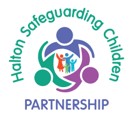Voice of Children & Young People
The Halton Safeguarding Children Partnership (HSCP) strongly believes that children and young people should have a say when decisions are made which may affect them. In order to safeguard and promote the welfare of children it is essential that practitioners gain a clear picture of their wishes, thoughts and feelings. Understanding the child’s lived experience will be achieved through listening to what children say, observing their non- verbal cues (particularly for pre-verbal and non-verbal children) and observing their interaction with family members and peers.
We also believe that children and young people should have the means and opportunities to be able to raise issues which are important to them, and ensure they are listened to. By doing so, we will create a stronger child protection system that is more responsive to the needs of our most vulnerable children.
It is good practice to ask the child or young person which practitioner they would like to gather this information from them.
- The right of a child or young person to be heard is included in the UN Convention of Rights
- The Children’s Act 2004 emphasises the importance of speaking to the child or young person as part of any assessment.
- The importance of speaking to a child or young person and gathering their views has been consistently highlighted in lessons learned from serious case reviews.
In both local and national research children have said they need the following:
- vigilance: to have adults notice when things are troubling them.
- understanding and action: to understand what is happening; to be heard and understood; and to have that understanding acted upon
- stability: to be able to develop an ongoing stable relationship of trust with those helping them.
- respect: to be treated with the expectation that they are competent rather than not.
- information and engagement: to be informed about and involved in procedures, decisions, concerns, and plans.
- explanation: to be informed of the outcome of assessments and decisions and reasons when their views have not met with a positive response.
- support: to be provided with support in their own right as well as a member of their family.
- advocacy: to be provided with advocacy to assist them in putting forward their views.
- protection: to be protected against all forms of abuse and discrimination and the right to special protection and help if a refugee.
Our Young People’s Voice & Influence Group works to ensure children and young people effectively participate in the work of the Halton Safeguarding Children Partnership.
The purpose of this group is to ensure that young people and children have a voice and a say in services and its new developments in Halton that affect them. This communication should be 2-way and the group acts to respond when services want to consult young people, and the group members identify which young people are able to respond.
The HCSP will endeavour to ensure that children and young people are appropriately involved in the decision making of the Partnership. We will also challenge and hold Partnership members to account on their engagement and involvement of children and young people within their own agencies.

